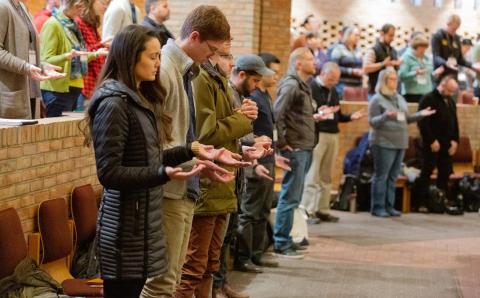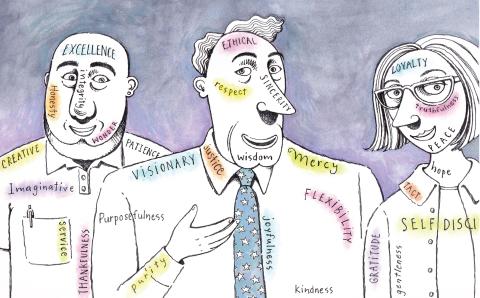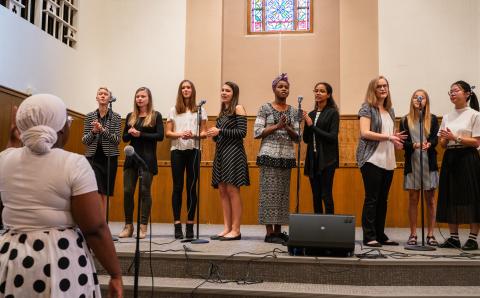Wherever you are as you read these words, you can be sure that God is present, here with you as Emmanuel, “God with us” (Matt. 1:23).
But are you fully present, here where God is? As a human, it’s likely you are partly here and partly elsewhere. Just this morning I woke up thinking about all the things I need to do at the office rather than noticing the warmth and coziness of my bed in that moment. Our minds naturally and regularly wander, disconnecting us from the reality of where we are. Often this wandering has a negative tone to it. We think about the past—the mistakes we made, the things done to us, the regrets we carry. And we think about the future, playing out scenarios about how things might go wrong and how we might respond.
Because of this mental wandering, it is not uncommon that we find ourselves missing chunks of information from our own experience. Have you ever driven yourself to your destination with no memory of the drive? Or perhaps you’ve discovered yourself lost in a daydream when you intended to be in prayer? My son this afternoon found himself sitting alone in a cold car after everyone else had gotten out while he remained absorbed in a library book in the back seat. He had a good laugh about it when he woke up to the present moment and finally made his way into the house.
The reality is that we live much of our life in a mental fog, operating in a swirling cloud of thoughts that keep us disconnected from ourselves, from one another, and from God. For some of us, this is an emotionally neutral experience. For others, it fuels chronic feelings of depression or anxiety. But for all of us, it blinds us from seeing all that God has for us, keeping us detached from the richness of God’s creation and provision in each given moment. Because of this, the practice of mindfulness is a deeply valuable tool for those who desire a deeper relationship with God.
Mindfulness is a simple concept. It means intentionally paying attention to the present moment with an attitude of nonjudgmental curiosity. This can be practiced formally, using times of silent meditation to hone our awareness of what is present around us moment to moment. It can also be practiced informally by regularly bringing our attention back to the present throughout each day. Mindfulness can be learned through a series of guided practices that teach us the attitudes of acceptance, openness, and compassion that accompany mindful awareness.
Like most practices of mental and physical wellness, mindfulness can be practiced in a purely secular fashion. But attention to the present moment is a component of all major world religions, including Christianity. We see this present-moment focus in a variety of Christian practices such as listening prayer and centering prayer. More broadly, Christian spiritual formation has deep roots in meditation and contemplation. Jesus himself modeled the importance of regularly withdrawing into solitude.
My own journey with mindfulness started reluctantly. I had heard mindfulness presented primarily from a Buddhist perspective, and I wasn’t sure whether it was compatible with my deeply held Christian beliefs. But at a point of deep emotional suffering in my life, I was desperate for relief, and I suspected the practice of mindfulness might be an opportunity for healing. It quickly became clear to me that this was indeed the case.
As I learned to move out of painful mental rumination into the present moment, I found that God was there, ready and willing to connect. Mindfulness quickly moved me out of a cognitive struggle with religion into a holy communion with God. God was right there with me, offering me a much lighter load than the one I was carrying on my own. I felt happy for the first time in my life, and I began enjoying the people around me more. It became easier to bounce back from disappointments or failures. Mindfulness was not always pleasant, just like other healthy habits such as exercise can be quite uncomfortable. But the result was an opening to God’s good gifts in each moment and a life more infused with God’s contentment and joy. Mindfulness turned out to be the gift that unlocked others God used in my life for deep healing.
So how do we practice mindfulness? It’s a bit like moving up onto a balcony to create observational distance from what’s happening in our own experience of the moment. As we do so, we cultivate an attitude of curiosity that does not judge, resist, or analyze our experience. We experiment with a direct awareness of experience in the moment, unfiltered by thoughts and language. Christians who practice mindfulness engage in this process with an awareness that God’s presence is part of what is present in the moment, acknowledging that all we observe in each moment is given by God.
You might wonder what types of things to observe in a moment. Mindful awareness often begins with physical sensations, supporting our experience as embodied creatures, connected to the bodies that God created for us and pronounced “good” at creation’s birth (Gen. 1:31). We notice what is coming through our senses (sight, sound, touch, smell, taste) and tune into the sensations of our breath. This grounds us in something that is always in the present moment: our body.
Mindful awareness also incorporates observation of thoughts. Scripture reminds us with some regularity that human thought is not fully reliable. “My thoughts are not your thoughts,” God tells us in Isaiah 55:8, and Paul encourages us to engage in an ongoing “renewing of your mind” (Rom. 12:2). Mindfulness practice increases conscious awareness of thoughts, giving us the opportunity to observe our thoughts without believing all of them or obeying them heedlessly. It opens up room for us to hear God’s voice rearranging and gently correcting our thought life.
Mindful awareness also incorporates observation of emotions. We notice our emotions, both pleasant and unpleasant, with gentle attention, knowing that God holds us with divine care and faithfully sees us through the emotional fluctuations of each day. We practice following Jesus’ instruction “Do not worry” (Matt. 6:31), observing our emotional triggers with curiosity in order to open ourselves up to God’s joy and peace from moment to moment.
Such mindfulness is a tool God uses for our healing and growth. It gives us the focus and openness needed to lay down resistance to the good gifts God has in store for us. Mindfulness keeps us awake and aware as we move through each moment, receiving each God-given breath that is granted this side of heaven. For the Christian, mindfulness is a gift that brings us into the only moment we can ever meet God: the present moment.
TRY IT
If you are interested in practicing mindfulness within a Christian framework, you might start with this simple practice. Set a timer for three minutes. Close your eyes (or relax your eyelids halfway) and become curious about physical sensations in your body, aware that you are in God’s presence and that your body is God’s creation. If you choose, pay particular attention to the sensations of breathing—the breath, given by God, coming into the body and exiting the body without any direction from you. When your timer goes off, take a moment to write down (or verbalize) the specific physical sensations that were present during that short breathing space, as well as any thoughts or feelings that you noticed. Thank God for this “temple of the Holy Spirit”—the body that God has given you—as you proceed into the rest of your day.
Discussion Questions
- What comes to your mind when you hear the word “mindfulness”? Have you ever tried this practice?
- Do you think mindfulness is compatible with Christianity? Why or why not? How would Christian mindfulness differ from other forms of mindfulness?
- Might some Christians’ uneasiness with mindfulness stem partly from a discomfort with their bodies and emotions as the practice brings more awareness to them? Is such discomfort with our bodies or emotions biblical?
- If mindfulness can help the Christian experience God’s presence, what other practices have helped you experience God’s presence?
About the Author
Irene Kraegel, Psy.D., is a licensed clinical psychologist who teaches mindfulness meditation to students at Calvin University, where she serves as director of the Center for Counseling and Wellness. Irene writes about mindful Christianity at themindfulchristian.com and @mindfulxian on social media. Her new book, The Mindful Christian: Cultivating a Life of Intentionality, Openness, and Faith, will be released in February 2020 through Fortress Press.







